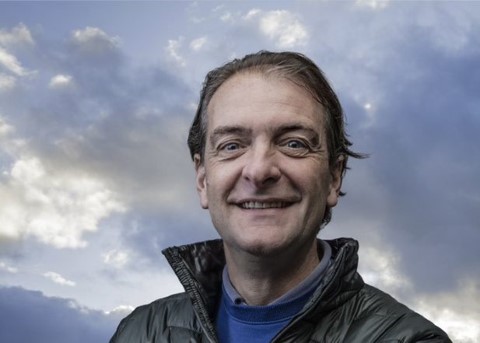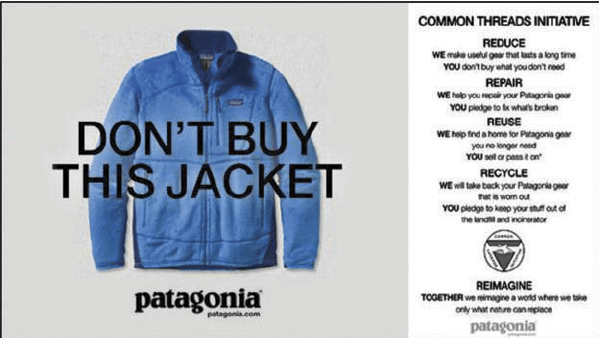“We need to move away from extractive capitalism, which only takes and does not give back to our one and only planet. In some ways, we are like Eric Carle’s Very Hungry Caterpillar. We’re insatiable in our need to collect more than we really need. In the past, it was normal to have just one or two pairs of shoes, instead of a collection including pairs we hardly ever wear. If we continue this way, relentless consumerism will bring us to the brink of extinction. Instead, we need different business models, that take responsibility for all stakeholders, not just the hungry shareholders,” says Matthijs Visch. He joined Patagonia as General Manager EMEA in May 2021. So it was high time to meet up with him for a conversation about his first year, driving behavior change with consumers, and inspiring other companies to change business models.
In business to save the planet
“At Patagonia, we’re in business to save our home planet. We limit ecological impacts by making goods that last for generations or can be recycled so the materials in them remain in use. And, through our grassroots partners, we embark on multi-year environmental campaigns. We put the environment at the heart of everything we do. Our Worn Wear program, for example, keeps clothing and equipment in use for longer and thereby lowers the impact, encouraging customers to reduce, repair, re-use, and recycle.
Our core users are fully aware of our mission. Yet there are many others who do not fully understand that we don’t just make great outdoor products, but that we’re on a mission! We therefore continuously need to raise awareness, using ads like our iconic “Don’t buy this jacket” ad.
Need for a new narrative
We also use thought-provoking videos like “We’re All Screwed?” to make people think – and inspire them for action. We really need a better narrative about future-proof ways of life to help raise awareness with a larger group of people so they can support the acceleration of change. I feel we still lack this narrative. Most stories are either too gloomy or too rosy to inspire change and action.
There clearly is no silver bullet and it takes time to drive change, just like it took me time to find my way at Patagonia. I’m quite impatient, also with myself, but I really needed to immerse myself in the organization and understand it at a deeper level to be able to contribute and jointly drive change.
3 steps to join the movement
“Patagonia is often seen as an iconic company, far removed from the rest. It’s not a simple trick to become like us, but it’s not that hard either. But change to a more mission-driven company does require a different attitude. Here’s what I think kickstarts the journey to a more future=proof business model:
- See your value chain as an ecosystem, rather than an arena. In an arena, some win and some lose. In an ecosystem, together, you build something positive and strong, mutually reinforcing. Value creation is not inherently wrong, but you have to take a holistic view and create value for customers, suppliers, communities, and our home planet. This is not a dream or a moonshot that’s only attainable for a few niche businesses. Instead, it’s within reach for many and it’s what the world needs to survive. But it does require a different attitude, leadership, and courage.
- Put your key impacts at the heart of your company’s mission. This starts from a strong (personal) conviction that this will yield a competitive advantage in the long run. Cocreate the strategies with internal and external partners in the ecosystem – to drive engagement and successful implementation of the strategies. And don’t count on a sustainability department to lead the way. Instead, make sure you deploy your entire organization against the change that’s needed – in the company and in society.
- Be radically transparent and honest about what is going well and what is not. As we implement our strategies and experiment, we will make mistakes and things will not all go as planned. Only if we are honest and transparent along the journey can we learn and continue to drive change. At every step, we demonstrate that profitability and accountability are not mutually exclusive objectives.
Due diligence legislation will drive value chain engagement
“What I truly love about my role at Patagonia is the engagement with a much wider set of stakeholders. It’s inspiring to be part of an ecosystem. And to take responsibility for that much wider set of stakeholders, beyond the shareholders. I think the upcoming EU Due Diligence legislation will drive deeper engagement in the value chain for a much larger group of companies – with a spill-over effect on their suppliers in their value chains and business models. The legislation is very focused on people and human rights. I strongly feel this scope should be extended to nature and the right to a clean world as well.
Transforming business models for positive change
“Patagonia is a for-profit company, but not at the expense of everything and everyone else. I am really enjoying my role and feel things are really starting to fall into place for an even stronger future. Within the company, my key roles are to ensure there is a clear strategy (co-created with others) and to develop and reinforce a safe working environment where everyone can be themselves and grow. Both business and environmental results will continue to be strong with those two in place. Outside of the company, through B-corp and other platforms, I really like to inspire others toward a transformation in consumer behavior and business models. Just like the very hungry caterpillar transforms into a butterfly. That isn’t just better for the world, but also a lot more fun!”
To find out more about Matthijs and what keeps him awake and engaged, follow him on LinkedIn. To read more about Patagonia, check out an earlier blog post and the letter from Patagonia’s founder Yvon Chouinard about making Earth Patagonia’s only shareholder. Interview by Marjolein Baghuis (@mbaghuis) for Change in Context. To read interviews with other interesting people, book reviews and other posts about change, leadership and sustainability, please subscribe.


